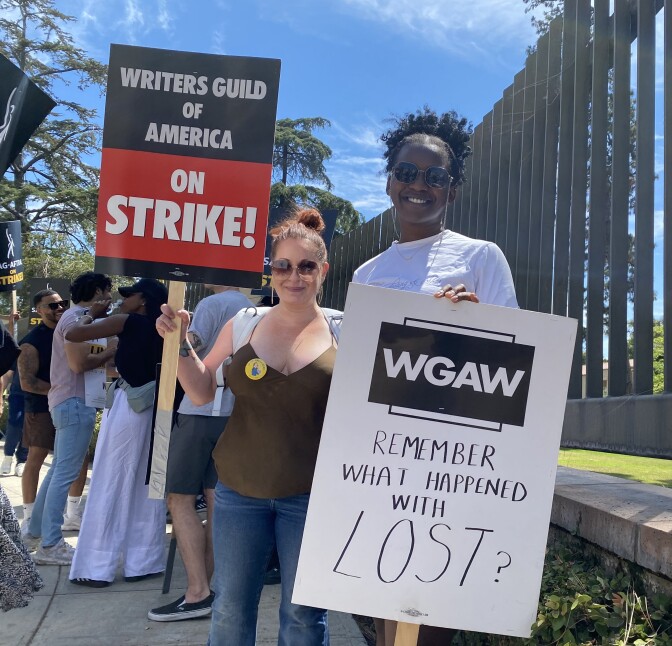This story is free to read because readers choose to support LAist. If you find value in independent local reporting, make a donation to power our newsroom today.
‘People Are Hurting’ — How The Hollywood Strikes Are Affecting Small Businesses In LA

Members of the Writers Guild of America have been on strike for nearly three months. They’re fighting for better pay and protections against artificial intelligence, among other demands.
And, Hollywood performers are now two weeks into a strike of their own.
With Hollywood mostly shut down, some local businesses are starting to feel the pinch.
Last Friday, hundreds of striking writers and actors picketed in the sweltering heat outside the Warner Bros. studio in Burbank. Bright-pink billboards for the new Barbie movie were plastered all around.

But even as summer blockbusters rake in hundreds of millions of dollars at the box office, economic anxiety is running high among striking performers, like SAG-AFTRA member April Rock.
“I’m at the level of just trying not to think about it ... afraid to check the bank account,” Rock said.
Uncertainty and community
That financial uncertainty isn’t just hitting actors and writers. Just across the street, Kismet Collective Salon opened up their bathroom to strikers.
Roxanne Schreiber said her dad, a retired set designer, came up with the colorful decorations inside the salon, and a local prop shop helped them renovate the space.
“I lost my job in production 15 years ago when we had the last writers strike... I know it affects the dry cleaners, the craft service people, the restaurants — everybody around the studios suffers because it is a company town,” Schreiber said.
It doesn’t help that Schreiber and her partners opened the salon just weeks before the writers strike started.
“I think all of us were a little worried opening a luxury-based business in a union town in the middle of a giant strike — most of our clients are in the industry,” Kismet co-owner Nicoletta Gauci told LAist.
But Schreiber says the strike hasn’t been totally bad for business. The surge of foot traffic gave them a sense of community — and at least a few new customers.

Contractors’ work halted
At his home about 15 miles northeast of the Warners lot, Johnny Agnew showed off his COVID project: a restored vintage mini motorcycle that used to lead parades in the '60s and '70s.
Through his business, Funky Junk Farms, Agnew has helped source countless vehicles for movies and TV productions, including the gold vintage trailer Leonardo DiCaprio’s character inhabits in 2019’s Once Upon a Time in Hollywood.
Agnew’s lot is filled with all kinds of cool old stuff that would make any period piece pop. There’s old Santa Claus blow molds, gas station memorabilia and plenty of vintage trailers.
But all of this great stuff has sat unrented since March, when studios started getting worried about the imminent writers strike.

“With my rental stuff I have to have guys work on reupholstering interiors of cars — if we’re doing picture cars — or a mechanic. None of those guys are working right now. That’s just me, myself and my little crew, so you can imagine what it must be like with all the other factions,” Agnew said.
By trade, Agnew is a unionized studio driver, getting equipment and actors where they need to go on set. But that work dried up in April. For now, Agnew said he’s happy he can just keep his mortgage paid.
“It’s huge because most people can’t survive off unemployment ... You know, most of us live from paycheck to paycheck to be honest with you," he said. "People are hurting."

Agnew pointed out that that’s not the case for some of the big studio executives. He hopes the people at the top of the earnings ladder get things settled soon so he can go back to work.
“They need to pull their heads out of their behinds and respect the working class, basically, is what it comes down to,” Agnew said.
For its part, the Alliance of Motion Picture and Television Producers said in a statement after the SAG-AFTRA strike was announced, that the union’s choice: “will lead to financial hardship for countless thousands of people who depend on the industry.”
They say their offers to both the WGA and SAG-AFTRA represent “historic” and “generous” pay increases, along with other protections and benefits.
Billions in estimated losses
When the writers strike began in May, Todd Holmes, a professor of entertainment industry management at Cal State Northridge, estimated it could cost the greater L.A. economy some $3 billion.
Holmes said he arrived at that estimate based on a study that looked at the economic impact of the last writer’s strike in 2007, adjusting for inflation and other factors.
“We’d have to increase that number substantially since now we’re factoring in SAG [strike],” Holmes told LAist. If the strikes continue into October, Holmes estimates the overall economic impact could be in the range of $4 to $5 billion.
“A lot of people are thinking that this goes on for another three months or so,” Holmes said.
In the meantime, Holmes says he’s interested to see how much local politicians will step in to move things toward a resolution.
At their last meeting, the L.A. County Board of Supervisors agreed to send a letter to the Alliance of Motion Picture and Television Producers, urging them to return to the negotiating table.
Gov. Gavin Newsom’s office said he had been in touch with both sides of the Hollywood strikes in order to try and help broker a deal.
Editor's note: Many LAist journalists are represented by SAG-AFTRA. However, they work under a different contract to the actors, and are not subject to this strike.








